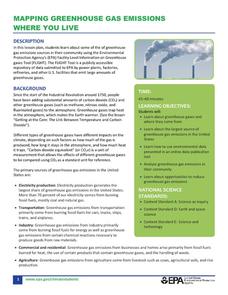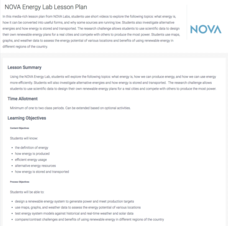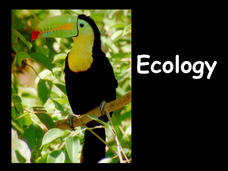K20 LEARN
Ecosystems, Human Activity, And Interactions, Oh My!: Human/Environment Interaction
Word clouds about ecosystems hook learners into a lesson that explores Yellowstone wildlife. Young scientists create cause-and-effect relationships after examining data and recommend solutions to their observed problems. More data...
American Museum of Natural History
Ask a Scientist About Our Environment
Let's ask an expert! Scientists at the American Museum of Natural History field questions about the environment in an interactive resource. Question topics range from global warming and conservation to endangered species and habitats.
Geography for Geographers
Five Themes of Iceland
How do the five themes of geography relate to the country of Iceland? Pupils learn about everything from the differences between relative and absolute location to how humans both adapt and change the environment. The presentation...
Consortium for Ocean Science Exploration and Engagement (COSEE)
One Ocean: It Matters!
Here is the first of four poignant lessons on how humans and oceans interact, even if people live far from the coast. This particular lesson also examines studies that are taking place in Antarctica of how climate change is affecting the...
US Environmental Protection Agency
Mapping Greenhouse Gas Emissions Where You Live
After investigating the US Environmental Protection Agency's climate change website, your environmental studies students discuss greenhouse gas emissions. They use an online interactive tool to look at data from power production...
Project WET Foundation
Explore Watersheds
What makes a watershed? What are the natural and human features of a watershed? How do human features affect watersheds? Where can I find my local watershed? These questions are thoroughly explained in an informative watershed interactive.
Environmental Protection Agency (EPA)
Teachers' Guide to Using A Day In the Life of a Drop
Hydrology hopefuls learn about their local watershed. Through discussion and online interactives, they see that their habits affect the water supply. The lesson concludes with a pledge to filter out bad water usage habits. It makes a...
CK-12 Foundation
Limiting Factors to Population Growth: Graphing Population Growth
If any of the limiting factors in an environment change, both animal and plant populations also change. The video explains two different models of growth and the impact of limiting factors. It highlights the carrying capacity of an...
NOAA
Deep-Sea Benthos
Much like a distant planet, the underwater world of deep-sea benthos is strange and largely unknown. How do creatures survive and thrive in such extreme pressure and temperature conditions? Young oceanographers join the crew of Operation...
UAF Geophysical Institute
System Interactions: The Lorax and the Truffula Tree
If the Lorax were to write a letter, what would he write? Introduce your class to systems and feedback loops through the whimsical stylings of Dr. Seuss. Learners take on the Lorax's point of view to write a letter, among other activities.
Science Matters
That’s An Otter Story
Young scientists discover how sea otters' habitats have changed due to human impact. Through conversation, video observation, and story reading, scholars identify how human interactions change a specific ecosystem in both positive and...
NOAA
Deep-Sea Corals
Come take a peak at the corals in the deep. Science scholars discover the hidden world of deep-sea corals in the third installment of a 13-part series. Topics include the differences between shallow water and deep-sea corals, the slow...
PBS
NOVA Energy Lab Lesson Plan
Can our energy resources keep up with our ever-growing population? Science scholars learn the basics of energy and Earth's energy resources during an electrifying lesson. The resource combines video clips and an engineering design...
Howard Hughes Medical Institute
Geological History of Oxygen
Earth didn't always have oxygen, so what caused the change that allows humans to live here? Learn about the change in O2 levels throughout geological history through an interactive graph. Each section offers greater detail on the changes...
Humanities Texas
A President's Vision: Thomas Jefferson
Here you'll find a fantastic resource for analyzing several primary sources regarding Thomas Jefferson's presidency, from his election and home in Monticello to the Lewis and Clark expedition and the Louisiana Purchase.
Owl Teacher
Introduction to World Geography
Give your learners a thorough overview of what they will learn when studying geography, from the five themes of geography (location, place, environment, movement, and regions) to the tools of a geographer and parts of a map.
Kenan Fellows
Making Connections with Water Quality
What's in your water? And, why is water quality so important? Enhance your class's level of water appreciation through a lesson that demonstrates the necessity of water quality. Environmental enthusiasts explore the EPA's Clean Water...
Discovery Education
Sonar & Echolocation
A well-designed, comprehensive, and attractive slide show supports direct instruction on how sonar and echolocation work. Contained within the slides are links to interactive websites and instructions for using apps on a mobile device to...
Science 4 Inquiry
Deforestation
Young scientists observe deforestation from satellite photos and discuss the importance of forests to the global environment. They then simulate a plot of forest when farmers move into the area over the course of seven years. Finally,...
Science 4 Inquiry
Enzymes in Action
Enzymes play a role in almost every function in the human body. Scholars explore three variables related to the use of enzymes. They observe a catalase reaction, experiment with substrates, and examine reactions rates.
NOAA
Energy from the Oceans
Can Earth's oceans produce a steady supply of clean energy? Scholars explore the uses of tidal and thermal energy in the 11th installment of a 13-part series about ocean-based alternative energy sources. Learners examine the current...
Biology Junction
Ecology
Psychologists study human relationships while ecologist study relationships between organisms in the environment. An introduction to ecology and the related vocabulary benefits scholars as they progress through the presentation and...
Personal Genetics Education Project
Scientific Themes in Personal Genetics
Humans can be tested for the presence of the BRCA gene, whose presence is an indicator that they have a greater chance of acquiring breast cancer than someone without the gene. Viewers have an opportunity to explore how genes and...
Serendip
Changing Biological Communities – Disturbance and Succession
After cutting down a forest to make a farm, how long would it take the environment to turn an abandoned farm back into a forest? Scholars study this exact scenario while they interpret many charts and graphs of the changing ecosystems as...

























